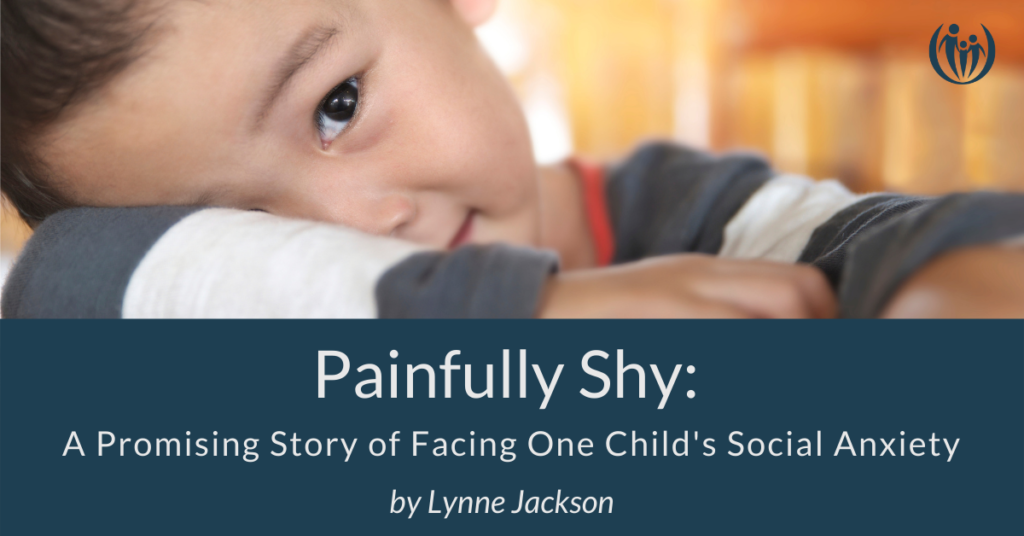
Painfully Shy: A Promising Story of Facing One Child’s Social Anxiety

Parents usually love when their kids are outgoing and gregarious crowd-pleasers. But when kids seem to avoid social situations, parents tend to get a bit anxious themselves. You may even make a proclamation or feel the need to apologize for your child, “Oh, he’s just painfully shy.”
While the “painfully shy” label could be accurate, it does nothing to honor the child or help him become more confident about who he is. Elaine Aron, Ph.D., and researcher regarding highly sensitive children discourages the use of the label shy. She also states, “Research indicates that ‘shy’ sons are often their mother’s least favorite child, while ‘shy’ daughters are often encouraged to stay at home and be mother’s special friend.” A parent’s beliefs about what their child’s “shyness” means can have a powerful impact on their relationship.
The first step in helping these more sensitive kids grow in confidence is to be aware of and address your own anxiety about it. Children feel your anxiety, and it adds to their aversion surrounding social situations. Your child may even begin to sense that everyone’s self-esteem rises and falls with the child’s sociability.
The next step is to make an effort to embrace your child’s sensitivity and be ready to talk about it in a positive way. “My child has a sensitive temperament and is more cautious than most kids, but once he feels at home in this situation, he’ll be just fine.”
Lynne’s personal story about social anxiety
I needed to learn this lesson when our daughter was young. My first attempt to help our anxious daughter Bethany meet new people usually involved dragging her out from behind me. Through gritted teeth, I would command her to use her 8-year-old voice to introduce herself. Like that’s gonna make her enjoy meeting new people!
When I laid aside my frustration and embarrassment to focus on what she needed to help her feel more confident, we began to make good progress.
Two contributing factors: sensitive and/or insecure
Children that resist participating in social situations may be sensitive to the sensory stimulation of new people or groups. Or they may be insecure about what they will do or say and be afraid of being rejected, ignored, or embarrassed. These children often want to be social, but their fear dominates the draw of being with people. It’s important to find out what is causing your child’s difficulty in social settings and develop proactive ways for her to be comfortable.
Want to dig deeper?
Check out Episode 73 of our podcast, “Classroom Anxiety: It’s Common, and You Can Help!”
Four ideas for a sensitive child’s social anxiety:
If the issue is sensitivity to the noise and chaos of a group, scale the stimulation level down. Work together until you figure out the “just-right-challenge” for your child.
- Plan outings with smaller numbers of kids, structuring fun activities that have a high degree of order vs. chaos.
- Do a fun muscle activity just before the social situation to relax your child.
- Help your child avoid crowds by entering a social situation before others get there or entering after others are settled. By doing so, they will not be swept in the door with a big wave of kids. Andy was so overwhelmed by being herded into his classroom in the bumping, chattering mayhem that he would spend his mornings in the bathroom. When his mom began to bring him early, he would connect with the teacher and complete a helpful task while the kids arrived. He immediately began to participate in class for the whole day.
- Let your child know you are available for a break if he gets overwhelmed. (If that’s an option — this won’t work for every situation.) Bring a few favorite books or toys for kids to get away and de-stress before rejoining the group.
Four ideas for an insecure child’s social anxiety:
If the issue is insecurity (low self-esteem, embarrassment, or anxiety about how to interact or what to say), the key is to build values and give kids skills to be confident and others-focused.
- Make feelings discussions a regular part of your family. If kids can begin to articulate feelings that are hindering them, those feelings begin to lose their intensity, and you can problem-solve the situations that intimidate them.
- Help your kids become more interested in others and less worried about being interesting to others.
- Make the question, “How were you a blessing to someone today?” a regular question at your dinner table. This cultivates a belief that caring about others is more important than trying to impress them.
- Teach kids how to ask questions. At dinners or car rides, play the Question Game: Each person asks someone a question and answers a question. Do this until everyone has had a turn at both answering and asking. Parents can model asking thoughtful questions and encourage kids for their efforts.
- Help kids recognize a special gift God has given them and how it might be helpful in a social situation. You could learn 1 Peter 4:10a together – “Each of you should use whatever gift you have received to serve others…”
- Give your child a helpful responsibility at the beginning of a social gathering. Examples might include: offering a glass of water or helping hang up the coats of guests. Serving others is a highly effective self-esteem booster.*
Eventually, Bethany blossomed into the true people-person that she is today. Together we figured out a series of “just-right-challenges” in small increments to help her learn to be comfortable with new people. For each step, we recorded a “bravery point,” and along the way, we even had two celebration dinners to discuss her progress. No need to pressure her anymore! She was excited to help others feel valued and comfortable.
Empower success in your child
For either type of child (sensitive or insecure), provide the minimum amount of help needed to empower success, and then gradually give less assistance as she gains confidence. This creates a “just-right-challenge” that enhances learning. When the social engagement is over, talk about what went well. When did your child have fun? Help someone? Share a toy or talk to another child? Celebrate the success!
Helping your child gradually replace insecurity with joy when they are with others prepares them to live out their calling to be a blessing in this world.
* Michael Resnick, Building Resiliency, from Concept to National Agenda, from a speech given at the Pacific Rim Conference of the International Association for Mental Health (June 25-28, 2000).

Do you have a child with BIG feelings and BIG needs?
The Sensitive & Intense Kids online course is a game changer. It’s for YOU.




